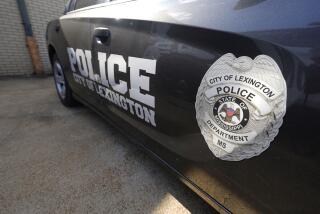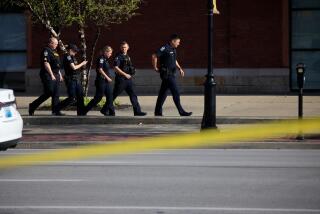A New Leaf in Kentucky: City Bans Indoor Smoking
- Share via
LEXINGTON, Ky. — Here in the heart of tobacco country, where farmers have nurtured fields of rich burley leaf since the 1700s, Lexington has done the unthinkable: banned smoking.
Karl Evans sat on a stool at Nicholson’s Cigar Bar and stared at the clock, grimacing as the minute hand ticked toward 12:01 a.m. Tuesday. Teeth clamped down on a Marlboro cigarette, he took a deep, determined draw.
For the record:
12:00 a.m. April 30, 2004 For The Record
Los Angeles Times Friday April 30, 2004 Home Edition Main News Part A Page 2 National Desk 1 inches; 44 words Type of Material: Correction
Antismoking law -- An article in Wednesday’s Section A about an indoor-smoking ban in Lexington, Ky., misspelled the name of Ferrell Guillory of the University of North Carolina as Ferrel Gilroy. Also, the name of restaurant owner Rob Ramsey was misspelled as Bob Ramsay.
In just under an hour, he would have to stub it out or be in violation of a new ordinance banning smoking. Lexington’s law, which prohibits lighting up in any enclosed public space, marks the first time that smoking has been illegal anywhere in Kentucky.
That means no more smoking in restaurants and bars -- or in malls, hotels or office buildings, for that matter.
“It’s just ridiculous. We’re in Kentucky: We drink Kentucky bourbon, eat Kentucky fried chicken and smoke Kentucky tobacco,” said Evans, 41, a truck driver who has lived in Lexington for three decades. “Not being able smoke to in a bar is like not being able to drink bourbon at the Derby.”
But the law reflects a new reality in Kentucky: The changing economic landscape has created a workforce that is slowly leaving the tobacco farms to work in industries such as high tech, bioengineering and high finance.
And social attitudes about smoking have begun to bend, even though 30% of adults and 37% of high school students here -- compared with 23% of adults and 28% of students nationwide -- say they regularly light up, according to a federal study.
“Ten years ago, I would have been laughed out of my job if I even mentioned proposing an antismoking ban,” said Dr. Melinda G. Rowe, Fayette County’s commissioner of health. It was Rowe’s department that in 2002 began a campaign to curtail youth smoking.
That led the Lexington-Fayette Urban County Council, the political body for the joint city-county government, to pass an ordinance in early 2003 banning not just smoking, but related items such as ashtrays and matchbooks.
A coalition of restaurant and bar owners filed suit to overturn the law.
On Thursday, the Kentucky Supreme Court, in a 6-1 ruling, upheld the ordinance and said the city had acted appropriately to “promote and safeguard public health.” The court struck the language that made ashtrays and matchbooks illegal.
As of Tuesday, business owners became responsible for stopping their customers from smoking, said Stephen F. Harris, the health department’s consumer protection director.
“They must tell their customers to not smoke. If the customer continues to smoke, they must tell them to leave,” Harris said. “If the customer does not leave, the management needs to call the police and have the customer arrested for trespassing.”
Fines for ignoring the law range from $100 for a first offense to $500 for the third and subsequent violations.
Many businesses tried to nudge their customers toward a smoke-free existence by getting rid of their ashtrays and matches in advance, but not without resistance.
“It’s just like California,” Carl Jackson, a Chicago engineer in town for a convention, complained as he wandered through the lobby bar at the Hyatt Regency Hotel in search of matches. All he found were small notices on each table: “No smoking please.”
Whether the Lexington health department can enforce the ban remains to be seen. There are just 15 employees to track complaints about 1,600 sites that sell food and all other public buildings covered by the ordinance.
According to the American Nonsmokers’ Rights Foundation, more than 1,700 municipalities have laws that restrict smoking.
California banned smoking in state buildings in 1993, expanding the law five years later to include gaming clubs and bars. Local governments then added their own restrictions.
To light up in a bar, smokers have to leave California. But in Lexington, they only need to drive 15 minutes to reach the county line.
“It’s not that far, even when there’s snow and frost on the ground in the winter,” said Ann Dills, 26, a graduate student studying social work at the University of Kentucky.
The population of Lexington -- at more than a quarter-million residents, it is Kentucky’s second-largest city -- has grown about 1% annually for the last two decades.
With the influx of new people, local business owners said, came unexpected conflicts over smoking. “We’d have brawls in the dining room between smokers who’d insist it’s their God-given right to light up and nonsmokers who’d yell that it’s their God-given right to breath clean air,” said Bob Ramsay, a former smoker who owns five restaurants in the area.
Some entrepreneurs began instituting smoking bans on their own in an effort to attract nonsmoking customers. Over the last several years, Ramsay made three of his restaurants near the town’s suburbs smoke-free.
Although bar business dropped from 20% of his overall revenue to 7% within a week, Ramsay said, he was able to recoup the loss because more customers came in for meals.
But the bars at his downtown locations -- popular among office workers and students at the University of Kentucky -- remained smoke-filled.
“The smoking gene is connected to the drinking gene,” Ramsay said. “The City Council is telling me that I won’t see any lost sales because of the ban? That’s just a lie.”
Tobacco consumption in Kentucky has in fact dropped slightly in recent years, said Ferrel Gilroy, a expert on the South at the University of North Carolina, Chapel Hill. But a bigger blow to the industry has been American cigarette companies’ increasing reliance on overseas suppliers.
“Tobacco is cheaper elsewhere,” said state Rep. Stephen R. Nunn, a Republican who represents the state’s largest tobacco-producing county. “Tobacco’s no longer king of Kentucky.”
The spike in cigarette taxes also has hurt the tobacco industry. In an effort to cut their budget deficits, at least 20 states have increased tobacco taxes in recent years.
The levy in Tennessee, a leading tobacco producer, jumped from 13 cents in 2002 to 20 cents last year. The state is considering whether to raise it even more. In Kentucky, the cigarette tax has stayed at 3 cents a pack since 1970. But lawmakers recently proposed raising it to 29 cents.
And then there are the smoking bans. Although Lexington is the first Kentucky city to pass such an ordinance, others may follow. Lawmakers in Louisville, the largest city, say they are considering a similar move and are watching to see what happens in Lexington.
So are businesses throughout the state. At least one Lexington establishment, Nicholson’s Cigar Bar, expects to shut down because of the ban. For the last eight years, fans of fine bourbon and high-end cigars have flocked to this cozy spot.
“We’re going to try to become a smokeless cigar bar, but realistically that’s not going to work for long,” said Dave Young, the company’s vice president. “People come here to do one thing: Smoke.”
On Monday night, customers settled into the oversized leather chairs that are tucked throughout the mahogany-trimmed room with the roaring fireplace. They had shown up to get in one last legal puff, glumly counting down the seconds before grinding out their cigars at midnight.
As the minutes passed, however, people began to relight their cigars. The bartender, Gary Works, issued a warning to each lawbreaker.
The customers ignored him.
Works walked behind the dark oak bar and began taking drink orders.
More to Read
Sign up for Essential California
The most important California stories and recommendations in your inbox every morning.
You may occasionally receive promotional content from the Los Angeles Times.










